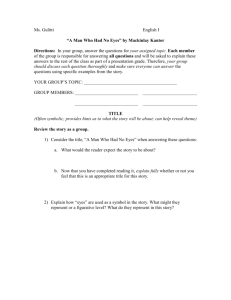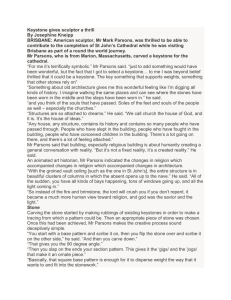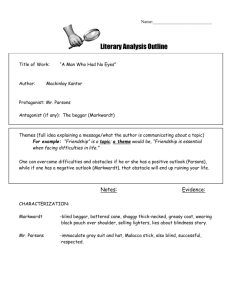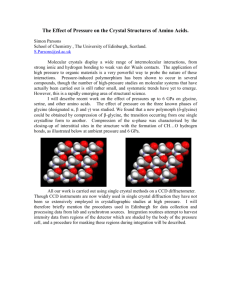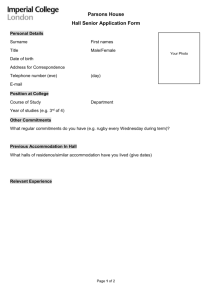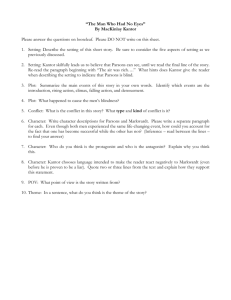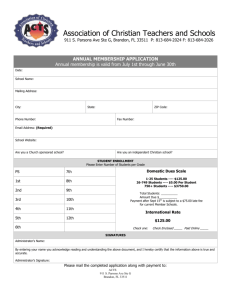Professional and Ethical issues
advertisement
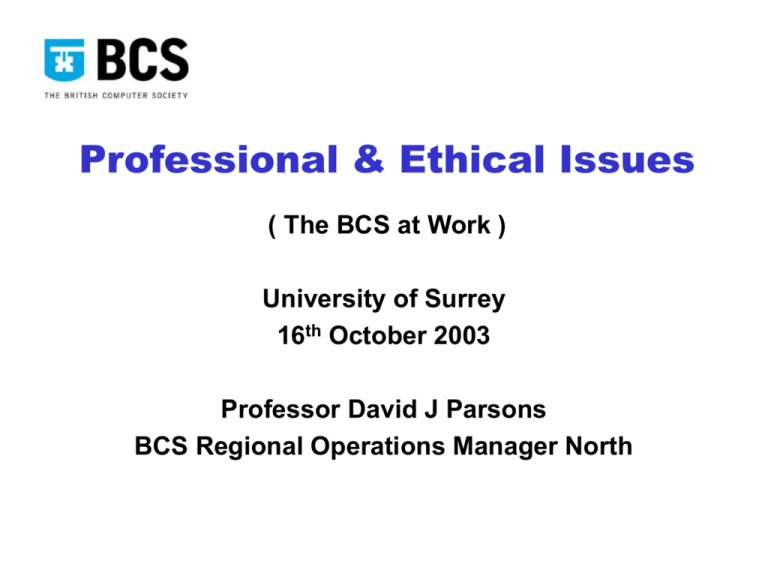
Professional & Ethical Issues ( The BCS at Work ) University of Surrey 16th October 2003 Professor David J Parsons BCS Regional Operations Manager North Agenda Today’s Business / Technology Environments The Role & Importance of Information Systems The Need for Professionalism Information Systems Engineering Professional & Ethical Issues Role of Professional Societies Conclusions We live in an increasingly complex environment President of the World Future Society said in his 1996 annual report : 'the global network of interconnected computers and telecommunications links is already the biggest machine ever built..... but it will likely become bigger and more powerful in the coming decades. This monster machine will fundamentally transform human life as we know it today.‘ We should ask whether is it just as relevant today – as we look at the Professional & Ethical Issues facing today’s IS Professional © David J. Parsons 2003 Professional – a definition ( NOD ) PROFESSIONAL - “of or belonging to a profession ....... involving training....... showing appropriate skill ........ maintaining proper standards ....... competent .... expert....." The Business Environment faced by today’s IS Professional • Change the only constant factor • Pressures on costs and revenues • Intensive competition - traditional markets under attack • Markets - global, location independent, customer focused • Customers - more demanding • Increasing range of technology related opportunities • IT becoming essential to compete © David J. Parsons 2003 The Technology Environment faced by today’s IS Professional • • • • • • • • • Change / pace of change Huge amounts of storage Ever increasing processing power Increasing amounts of networking bandwidth Better - faster - smaller - cheaper Pervasive / ubiquitous computing Mobile / portable everything 'E' / ‘M’ everything Technology driven Information / 'cyber' age © David J. Parsons 2003 The ‘Martini’ Scenario Anytime - anyplace - anywhere Technology that will allow ANY user : ANY where ANY time ANY how Authorised access to : ANY products ANY services ANY information Available from Located : ANY information or service provider ANY where ANY distance from the user The ‘Martini’ Scenario - the ‘right’ one Technology that will provide the RIGHT user : Authorised access to :the RIGHT products the RIGHT services the RIGHT information At the RIGHT location In the RIGHT format At the RIGHT time For the RIGHT price ISE IMPORTANCE Information Systems now critical to Individuals Business & Wealth Creation Communications National Economy Information Systems have become all Pervasive The need for Professionalism Are IS / IT Professionals getting it RIGHT ? Remember the old adage : PERCEPTION IS REALITY Some surveys suggest that the performance of the IS /IT Industry leaves much to be desired. Scientific American Survey - 1994 Gartner / Standish Surveys - 1998 OASIG Survey – 1998 © David J. Parsons 2003 The Need for Professionalism Survey Results - 1 Scientific American 1994 25% of all large scale developments cancelled Gartner / Standish 1998 Almost 33% of the projects failed altogether OASIG 1998 About 40% of developments fail or are abandoned © David J. Parsons 2002 The Need for Professionalism Survey Results - 2 Gartner / Standish 1998 Almost 75% of IT projects exceeded their budgets & schedules OASIG 1988 About 80% of systems are delivered late and over budget © David J. Parsons 2002 IS Industry Performance – 3 What about something more up to date ? Standish 2002 * 31% of projects cancelled before completion 88% of projects exceed deadline, budget or both For every 100 starts, there are 94 restarts Average cost overrun – 189% Average schedule overrun – 222% * IT Project Management : On Track from Start to Finish Joseph Philips ( McGraw Hill ) 2002 © David J. Parsons 2003 IS Industry Performance – 3 What about nearer home ? Computing 26th Sept. 2002 “More project skills for civil servants” 3rd Oct. 2002 “Trials begin on Child Support IT system” Computer Weekly 3rd Oct. 2002 “ National insurance number errors not taxpayers fault “ © David J. Parsons 2003 IT Professionalism – some questions ?? As IS / IT Professionals - is this level of performance acceptable ? Would a situation in other branches of engineering be accepted if, for example : 4 bridges in 10 failed ?? 4 out of 10 miles of new highway were unusable ?? Are there differences between Information Systems Engineering and other branches of Engineering ? What can be learnt that will help the IS /IT Professional ? © David J. Parsons 2003 The Need for Professionalism Computing - 7th August 2003 “IT failures show lessons have not been learnt” POST ( Parliamentary Office of Science & Technology ) Report on GOVERNMENT IT PROJECTS – July 2003 © David J. Parsons 2003 Report on GOVERNMENT IT PROJECTS – July 2003 Technology Issues – specific to IT : Rapidly changing technology User requirements Complexity Oversight Project Issues : Relations with Suppliers Project management © David J. Parsons 2003 Report on GOVERNMENT IT PROJECTS – July 2003 Causes of Project Failure : Lack of clear link between project and organisations priorities Lack of clear senior management ownership Lack of effective engagement with project stakeholders Lack of project / risk management skills Lack of understanding / contact with supply industry Evaluation driven by price NOT value for money Too little breakdown of projects into manageable steps Inadequate resources and skills to deliver requirements © David J. Parsons 2003 Professional – a definition ( NOD ) PROFESSIONAL - “of or belonging to a profession ....... involving training....... showing appropriate skill ........ maintaining proper standards ....... competent .... expert....." Information Systems Engineering Key words Taken from the Definition of Information Systems Engineering agreed between the BCS and the Engineering Council : Creation, use and support of information systems for the solution of practical problems. Specification, design, construction, testing, bringing into service, maintenance and enhancement Quality assurance Design, development and use of standards and tools Fitness for purpose, range of functionality, economy and efficiency, reliability, cost-effectiveness, security and safety, and life cycle support. © David J. Parsons 2003 Where do we need to develop our professional skills, be expert, competent etc. ? Technical skills associated with our profession : Programming, systems, operations, support etc.... Other skills essential to most ( including our ) professions People Project Personal © David J. Parsons 2003 Professional Responsibilities – ‘people’ examples Systems impact people Users, individuals, management, colleagues, customers, clients etc. Considering impact on work & working practices Ensuring fitness for purpose – meeting users’ / clients’ needs Team matters – leading, coaching, advising © David J. Parsons 2003 Professional Responsibilities – Project Management examples Requirements – care & diligence ( including legal issues ) Solutions – ensuring designs meet requirements Risk Analysis – security, restart, recovery Task / time / skills / resource scheduling / management Meeting schedules within budgets Ensuring quality at all stages of systems life cycle © David J. Parsons 2003 Professional Responsibilities – a few Legal examples Health & Safety - Critical Systems Data Protection Intellectual Property Computer Misuse Computer Contracts Computer generated evidence etc. etc. © David J. Parsons 2003 Legal Issues A few important thoughts We all have a duty to comply Technology - including software is relatively new Law not always considered adequate to deal with issues thrown up by new technology Legal Profession has variable levels of experience as to how the law relates to IT Legal issues can be & often are complex Complexity increases with global operations Find a good lawyer !! Professional Responsibilities – ‘personal’ examples Taking responsibility for own actions & those of subordinates including our CPD - ( Continuing Professional Development ) Maintaining our knowledge & understanding Developing our competence & expertise If necessary, identifying actual / potential personal conflicts of interest © David J. Parsons 2003 So we have : Issues, Pressures, Challenges, Opportunities associated with : • Business Pressures / challenge of change • Technical challenges & opportunities • People issues • Project ( including legal issues ) • Personal professionalism - keeping ‘up to date’ & maintaining high standards of personal behaviour & this is where Professional Ethics need to be considered © David J. Parsons 2003 ETHICS – definitions General - New Oxford Dictionary ‘Moral principles that govern a person’s behaviour or the conducting of an activity ‘ Ethics & Computing - Robert Ayers : Professional Issues in Computing ‘Ethics is concerned with questions of right and wrong, good and bad, and determining how people should behave in particular situations’ © David J. Parsons 2003 PRACTICAL Computer Ethics NOT academic philosophical study BUT Practical issues - e.g. Dealing with personal uncertainties Dealing with conflicts of opinion What choice should I make ? Is this action unfair ? Source : Duncan Langford Practical Computer Ethics © David J. Parsons 2003 Professional Behaviour Why be ethical ? Discussions held with Computer Science undergraduates suggest these points : TRUST as a reliable IS / IT Professional SECURITY guarding against unexpected outcomes COMFORT peace of mind Source : Duncan Langford – Practical Computer Ethics © David J. Parsons 2003 Professional Behaviour Which action should I take ? Ethics Check Questions Taken from Blanchard & Peale : The Power of Ethical Management Is it LEGAL ? Will it violate either civil law or company policy ? Is it BALANCED ? Is it fair to all concerned - short and long term ? Does it promote win-win relationships ? How will it make me feel about myself ? Will it make me feel proud ? Would I feel good if my decision were published ? Would I feel good if my family knew about it ? © David J. Parsons 2003 Professional & Ethical Issues Professional Behaviour – sources of help We have briefly discussed how systems impact & issues related to: people, projects, personal professionalism We have also briefly looked at the need for professional compliance personal integrity high standards of personal behaviour Is there a source of help ? e.g. Can the Codes of Conduct / Practise of the Professional Societies provide any useful guidelines ? © David J. Parsons 2003 Professional Societies – a source of help ? What can they do / what do they do ? Accredit individual professional competence and integrity Advise the UK Government on IS-related matters, examine & initiate debate on topical IS issues Represent profession on issues of importance Set standards for education and training Provide opportunities for networking through branch and specialist groups IMPORTANTLY they set standards for professional conduct etc. etc..... © David J. Parsons 2003 Professional Society - Codes of Conduct Define rules of Professional & Personal Conduct ( i.e. behaviour ) ( in the case of the BCS the professional standards required as a condition of membership ) Allow evaluation of what should be expected from members of their profession. Provide clear definitions of what is acceptable and what is unacceptable behaviour © David J. Parsons 2003 British Computer Society Code of Conduct & Practise The BCS Introduced Revised Codes of Conduct and Practise in January 2002. The revised Code of Conduct covers : The Public Interest Rules 1 - 6 Duty to Relevant Authority Rules 7 - 9 Duty to the Profession Rules 10 - 13 Professional Competence & Integrity Rules 14 – 17 Copies can be ‘downloaded’ from the BCS WEB Site © David J. Parsons 2003 British Computer Society Code of Conduct & Practice Code of Practise covers : Maintaining ‘standards’ of competence & Members’ Duty of Professional Care Upgrading/ maintaining personal knowledge / skill Maintaining awareness of relevant : • technological developments • procedures • standards Encouraging sub-ordinates to do the same © David J. Parsons 2003 Other Organisation Codes of Conduct & Practice Institution of Analysts and Programmers (IAP) Similar in structure to the BCS Includes Duties to the Public, Profession, the IAP, Clients / Employers ACM - Code of Ethics & Professional Conduct Defined in terms of : General Moral Imperatives Specific Professional Responsibilities Organisational Leadership Imperatives Institution of Electrical Engineers Institution for the Management of Information Systems There are links to these and many others from the BCS WEB Site © David J. Parsons 2003 Looking to the future.......... As IS Professionals we can expect to see pressure for Professional Standards & Behaviour from : Customers / Clients / Users Industry & Commerce Government & possibly the Insurance Industry © David J. Parsons 2003 To help to respond to the issues / pressures : Professional Societies can provide : Some useful guidelines e.g. through Codes of Conduct / Practice Support e.g. Branches & Specialist Groups CPD Schemes etc.. © David J. Parsons 2003 Some Conclusions for IS/IT Professionals Putting the ISSUES in context Information systems are here to stay ! Technology is becoming all pervasive Technology & associated information systems are becoming / have become essential to most / many businesses Businesses will demand more of the technology & information systems investments e.g. quality, reliability, functionality As individuals involved with IS/IT we ALL need to be professional and act professionally Perhaps Professional Societies like the BCS can help. © David J. Parsons 2003 The increasingly complex information & technological infrastructure - a challenge President of the World Future Society : 'the global network of interconnected computers and telecommunications links is already the biggest machine ever built..... but it will likely become bigger and more powerful in the coming decades. This monster machine will fundamentally transform human life as we know it today.‘ This comment was made in 1996 – is it just as relevant today ? © David J. Parsons 2003 The FUTURE ? What other Professional & Ethical issues do IS Professionals need to be considering ? These are some of my thoughts / questions : Are we becoming excessively reliant on IT ? Any there morally/ethically objectionable uses of IT ? What will be the social impact of incessant growth of IT ? Will DATA be the next major pollutant ? Are we developing a digital divide – separating the information haves from the information have nots . I leave them with you - no doubt you can and will add your own thoughts to this list ! © David J. Parsons 2003 The increasingly complex information & technological infrastructure - a challenge President of the World Future Society : 'the global network of interconnected computers and telecommunications links is already the biggest machine ever built..... but it will likely become bigger and more powerful in the coming decades. This monster machine will fundamentally transform human life as we know it today.‘ It surely HAS and surely WILL continue so to do. That is why an understanding of PROFESSIONAL, ETHICAL and related ISSUES is so important to us all. © David J. Parsons 2003 Thank You

